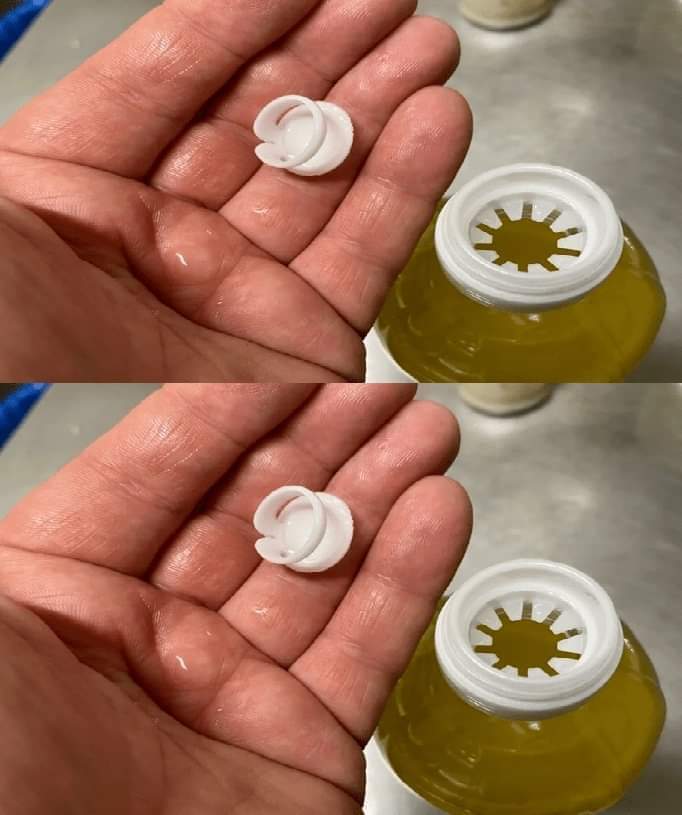ADVERTISEMENT
2. Infusing Oil for Future Use
Oil that has already been used to cook with—especially when it contains bits of garlic, herbs, or other aromatic ingredients—can be stored and used for future cooking. The best part? The oil has already absorbed all those flavors and will add even more character to the next dish.
To do this:
- Pour the used oil into a clean jar or bottle and let it cool.
- Strain out any food particles using a fine mesh strainer or cheesecloth to avoid unwanted bits in your oil.
- Store it in the fridge for future use—just be sure to use it within a couple of weeks, as reused oil can go rancid over time.
3. Using Oil for Homemade Skincare
Another surprising way to repurpose your used oil is for skincare. After all, oils like olive oil, sunflower oil, or even coconut oil are full of nourishing properties.
- Homemade Lip Balm: If the oil has only been used for mild cooking (such as sautéing vegetables or eggs), you can strain out any solid bits and use it as the base for a simple homemade lip balm. Combine it with beeswax and a bit of honey for a moisturizing lip treatment.
- DIY Hair Mask: Some oils, like those used for frying or sautéing, can be great for a deep-conditioning hair mask. The leftover oils from a vegetable stir-fry, for example, contain nutrients that can restore shine and moisture to dry hair.
Important note: Avoid reusing oil that’s been used for deep frying fatty foods like chicken or donuts, as the oil will be too greasy and may have absorbed flavors you don’t want to transfer to your skin or hair.
4. Composting Used Cooking Oil
If you’re an eco-conscious home cook, you might be aware that throwing cooking oil down the drain or in the trash isn’t the best for the environment. A more sustainable alternative is composting small amounts of oil. Cooking oil, when added in moderation, can break down in compost and add carbon to your pile, helping it balance out with nitrogen-rich materials like kitchen scraps.
However, don’t compost oil in large amounts as it can disrupt the composting process. If you only have a small amount, it can work to nourish the microorganisms in the compost, and over time, it will break down and contribute to richer soil.
5. Repurposing Oil in Non-Culinary Ways
You may be surprised to learn that oil can even come in handy outside of the kitchen. Used cooking oil can serve as a simple solution for a variety of household tasks, such as:
- Lubricating Hinges: A bit of used oil can work as a lubricant for squeaky doors and gates. Just apply it with a cloth or cotton swab to the hinge to eliminate the squeak.
- Polishing Furniture: Some types of used oil, like olive oil, can be applied to wooden furniture to bring out its shine and remove dust. Make sure to use it sparingly and wipe off excess oil to avoid a greasy finish.
- Removing Sticky Residue: If you have sticky residue from tape, labels, or adhesives, a little used cooking oil can help dissolve it without damaging the surface underneath. Just rub a small amount onto the sticky spot and wipe away the residue.
Final Thoughts
So, the next time you’re about to throw away the oil plug from your frying pan or pot, take a moment to consider the many creative ways you could repurpose it. Whether you’re cooking, crafting, or caring for your home, the oil can serve a useful purpose beyond just being a temporary cooking agent. Reusing cooking oil isn’t only sustainable, but it can add depth and complexity to your future dishes—while also giving you a chance to reduce waste and make the most of what you have in the kitchen.
Thanks to my colleague, I now look at that oil plug in a completely different way—and I’m never tossing it away again!
ADVERTISEMENT
